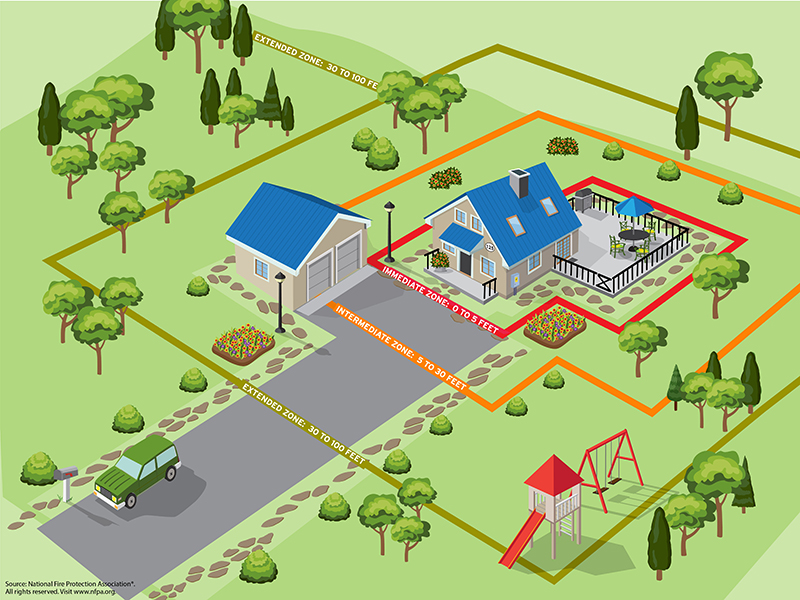News
From Risk to Resilience: Tips for Building in Wildfire Zones

Living near nature’s beauty often means navigating potential risks, and for those considering building a home in wildfire-prone areas, this reality comes sharply into focus. While the allure of breathtaking landscapes and serene surroundings is undeniable, so too is the importance of planning and preparation to mitigate the dangers posed by wildfires.
By adopting a proactive approach and integrating fire-resistant strategies into the building process, homeowners can transform their dream homes into resilient sanctuaries. Here are essential tips and considerations for building in wildfire zones:
1. Site Selection and Planning
The first step in building a home in a wildfire-prone area is strategic site selection. Opt for locations with lower wildfire risk whenever possible. Consult local wildfire hazard maps and consider the history of wildfires in the area. Avoid sites surrounded by dense, highly flammable vegetation or those located in narrow valleys where fires can spread rapidly.
When choosing your building site, prioritize the following:
- Distance from Flammable Materials: Maintain adequate distance from vegetation, particularly trees, and shrubs that could act as fuel during a wildfire.
- Access and Escape Routes: Ensure there are multiple access points and escape routes from your property, allowing for easy evacuation during emergencies.
- Water Sources: Identify nearby water sources for firefighting purposes and ensure your home is accessible to fire trucks and emergency responders.
2. Design and Construction
Designing and constructing a home with fire-resistant materials and techniques is crucial for reducing vulnerability to wildfires. Consider the following design principles:
- Roofing Materials: Consider selecting fire-resistant roofing materials such as asphalt shingles, clay tiles, or metal, especially in regions like Michigan where metal roofing can offer durability and fire resistance. It’s important to steer clear of materials like wood shakes or shingles, which pose a higher risk of combustion in the event of a wildfire.
- Exterior Walls: Use non-combustible materials for exterior walls whenever possible. Brick, stucco, concrete, or fire-rated siding materials offer greater protection against flames.
- Windows and Doors: Install dual-pane or tempered glass windows that are less likely to shatter in intense heat. Consider using metal or solid wood doors with tight seals to prevent embers from entering the home.
- Vents and Eaves: Use mesh screens over vents and eaves to prevent ember intrusion. These small embers can easily ignite materials inside the home.
3. Landscaping and Vegetation Management
Effective landscaping and vegetation management are critical components of wildfire preparedness:
- Defensible Space: Create a defensible space around your home by clearing vegetation and combustible materials. Maintain a minimum clearance of 30 feet around structures, and consider extending this zone to 100 feet in high-risk areas.
- Firebreaks: Implement firebreaks such as driveways, gravel paths, or lawns to create barriers that can slow or stop the spread of fire.
- Plant Selection: Choose fire-resistant plants for landscaping and avoid highly flammable species. Keep plants well-irrigated and pruned, and regularly remove dead vegetation.
4. Maintenance and Preparedness
Ongoing maintenance and preparedness efforts are essential for ensuring the long-term resilience of your home:
- Regular Inspections: Conduct regular inspections of your property to identify and address potential fire hazards.
- Emergency Plan: Develop and practice a comprehensive emergency plan with your family. Ensure everyone knows evacuation routes, meeting points, and communication procedures.
- Community Engagement: Engage with your community and local fire department to stay informed about wildfire risks and preparedness initiatives.
5. Insurance and Financial Preparedness
Lastly, ensure your home is adequately insured against wildfire damage. Review your insurance policy regularly to understand coverage limitations and exclusions related to wildfires. Consider additional coverage options that may be available to protect your property and belongings.
Conclusion
Building a home in wildfire-prone areas requires careful planning, thoughtful design, and ongoing vigilance. By incorporating fire-resistant strategies into every stage of the building process, homeowners can significantly reduce the risk of wildfire damage and create resilient homes that stand strong in the face of nature’s challenges.
Remember, the investment in fire-resistant construction and preparation not only protects your property but also enhances the safety and security of your family and community. With these tips in mind, you can transform potential risks into opportunities to build a safe and sustainable home in wildfire zones.
News
Unlocking the Magic of Gemstones: A Comprehensive Guide

Gemstones have captivated human fascination for centuries. From their radiant hues to their alleged metaphysical properties, these precious stones hold a unique allure. Exploring their diversity, history, and significance can be an enthralling journey. Let’s delve into a comprehensive guide to unravel the secrets of gemstones.
Introduction:
Gemstones have adorned civilizations, sparked myths, and embellished jewelry for eons. This comprehensive guide aims to demystify the world of gemstones, from their classifications to their cultural significance, helping you appreciate their beauty and value.
Types of Gemstones:
Gemstones span a vast spectrum of varieties, each boasting unique qualities. From precious diamonds to vibrant emeralds and mystical opals, explore the distinctive characteristics and allure of these different gem types.
Gemstone Meanings and Symbolism:

Beyond their aesthetic appeal, gemstones are steeped in symbolism and meaning across cultures and traditions. Uncover the significance behind specific stones and their perceived impact on emotions, healing, and spirituality.
How to Identify Authentic Gemstones:
With a plethora of synthetic and imitation gemstones flooding the market, understanding how to distinguish genuine stones is crucial. Learn the techniques and tips to authenticate and identify real gem-stones.
Popular Uses of Gemstones:
Gemstones aren’t limited to just jewelry. Discover their diverse applications in various industries, from alternative medicine to technological advancements and even artistic pursuits.
Caring for Your Gemstones:
Proper maintenance and care are essential to preserve the beauty and value of gemstones. Explore the best practices for cleaning, storing, and safeguarding your precious jewels.
Buying Guide: Choosing the Right Gemstone:
Navigating the purchase of gem-stones requires knowledge. This section provides guidance on selecting the perfect stone, considering factors like authenticity, cut, clarity, and more.
Gemstones in Culture and History:

Explore the rich tapestry of history and culture woven around gem-stones. From ancient civilizations to modern-day traditions, delve into the stories and significance of these prized jewels.
The Science Behind Gemstones:
Delve into the scientific aspects of gem-stones, understanding their formation, composition, and geological occurrences, unraveling the mysteries of their creation.
Sustainable Mining Practices in the Gemstone Industry:
Amid concerns of environmental impact, learn about sustainable mining practices and ethical considerations in the gemstone industry to support responsible sourcing.
Unlocking the Brilliance of 72 Small Gemstones
In the realm of gemstones, the allure of the small yet mighty 72 gemstones, often termed as “gemidinho de 72 pequenas lo,” holds an enigmatic charm. Exploring the exquisite world of these diminutive wonders unveils a treasure trove of beauty, history, and mystique.
Unveiling the Splendor of Gemidinho de 72 Pequenas Lo
What Makes Them Unique?
The captivating essence of the gemidinho de 72 pequenas lo lies in their exceptional rarity and distinct characteristics. These petite gemstones possess a remarkable blend of vibrant hues, captivating brilliance, and unparalleled clarity, making them a collector’s dream.
The Origin Story
Tracing Their Origins
The origin story of these 72 gemstones weaves through the annals of ancient civilizations. From whispered tales of their discovery in mystical lands to their evolution through time, each stone carries a narrative that transcends generations.
Historical Significance

These gems hold not only aesthetic appeal but also historical significance. Legends speak of their association with revered figures, attributing them with mystical powers and divine connections, amplifying their allure beyond their physical attributes.
The Allure of Rarity
Rare Treasures
The scarcity of the gemidinho de 72 pequenas lo elevates their desirability. Their limited availability adds an air of exclusivity, attracting enthusiasts, collectors, and connoisseurs alike.
Understanding Their Value
Appreciating the Intricacies
Delving into the intricacies of these gems unveils the meticulous craftsmanship and expertise required in their formation. Understanding their value involves a nuanced grasp of their rarity, color, cut, and clarity, factors that define their allure.
Embracing the Beauty
Aesthetic Appeal
The mesmerizing beauty of these gemstones transcends mere aesthetics. Their charm lies in their ability to evoke emotions, create legacies, and serve as timeless symbols of elegance and sophistication.
Investing in Elegance
The Appeal to Collectors and Connoisseurs

For collectors and connoisseurs seeking to invest in elegance, the gemidinho de 72 pequenas lo stand as a testament to refined taste and a penchant for the extraordinary.
In conclusion, the enchanting saga of the gemidinho de 72 pequenas lo encapsulates an unparalleled blend of rarity, history, and allure. As these gem-stones continue to captivate the imagination of enthusiasts worldwide, their timeless appeal persists, making them a coveted treasure in the world of precious stones.
FAQs:
1. What are birthstones, and how are they determined?
Birthstones are gems associated with specific months and are often linked to a person’s birth month.
2. Are synthetic gem-stones less valuable than natural ones?
Synthetic gem-stones can be equally valuable based on their quality, but their value may differ from natural stones.
3. Can gem-stones affect one’s energy or well-being?
Beliefs about gem-stones affecting energy or well-being vary among individuals and cultures. Scientific evidence supporting this is limited.
4. How do I know if a gemstone is authentic?
Consulting a certified gemologist or using gemological testing tools can help authenticate gem-stones.
5. What is the rarest gemstone?
Various gem-stones are considered rare, with some like red diamonds or jadeite commanding exceptionally high prices due to scarcity.
6. Can gemstones lose their color or luster over time?
Improper care or exposure to harsh conditions can affect a gemstone’s appearance over time.
7. What is the significance of wearing certain gem-stones?
Different cultures attribute various meanings and significance to wearing specific gem-stones, often tied to beliefs in luck, protection, or healing properties.
8. How can I clean my gemstone jewelry at home?
Cleaning methods vary based on the gemstone. Generally, mild soap, water, and a soft brush can be used for gentle cleaning.
9. Are there ethical concerns in the gemstone industry?
Yes, unethical mining practices and issues related to labor rights and environmental damage exist in the gemstone industry.
10. Can gemstones be an investment?
While some gem-stones can appreciate in value, investing in them requires thorough research and understanding of the market.
Conclusion:
The allure of gemstones extends far beyond their dazzling appearance. This guide aimed to unlock the mysteries surrounding these precious jewels, exploring their cultural, historical, and scientific facets. Embrace the magic of gemstones, appreciating their beauty while understanding their profound significance across civilizations.
News
Unlocking the Power of WordfinderX: A Comprehensive Guide to Effective Keyword Research

Explore the potential of WordfinderX for impeccable keyword research. Dive into this comprehensive guide to learn how to optimize your content strategy with the right keywords.
Introduction:
In the ever-evolving digital landscape, keyword research remains a cornerstone of successful content strategy. WordfinderX emerges as a powerful tool, offering insights and opportunities for website optimization. This guide unveils the intricacies of leveraging WordfinderX to its fullest potential. Dive into these sections to master the art of keyword research:
Understanding WordfinderX
WordfinderX, a robust keyword research tool, provides a comprehensive database for identifying relevant search terms. With an intuitive interface and extensive database, it simplifies the process of discovering keywords tailored to your niche.
Utilizing Advanced Features
Delve deeper into WordfinderX’s advanced
functionalities, including filtering options, competitor analysis, and trend tracking. Uncover hidden gems by harnessing these features to refine your keyword selections.
Crafting High-Impact Content
Learn how to integrate identified keywords seamlessly into your content. Craft engaging and SEO-optimized articles, blogs, or web pages to enhance visibility and attract organic traffic.
Implementing SEO Strategies
Leverage WordfinderX insights to implement proven SEO strategies. From on-page optimization to backlink building, explore tactics to boost your website’s search engine rankings.
Analyzing Keyword Trends
Stay ahead in the dynamic digital landscape by understanding keyword trends. WordfinderX equips you with the tools to analyze and adapt to changing search behaviors effectively.
Navigating Competitive Landscape
Uncover your competitors’ keyword strategies and gain insights to refine your own. WordfinderX aids in dissecting competitor keywords, allowing you to strategize for a competitive edge.
Optimizing Local SEO
Explore the nuances of local SEO through WordfinderX. Enhance your visibility in local searches by targeting location-specific keywords and optimizing your online presence.
Integrating Long-Tail Keywords
Discover the potential of long-tail keywords in attracting targeted traffic. Learn how WordfinderX facilitates the identification and integration of long-tail keywords for improved conversion rates.
Expanding Semantic Search
Explore the world of semantic search and its impact on keyword relevance. WordfinderX assists in identifying semantically related terms for a more holistic content strategy.
Measuring Success Metrics
Unravel the metrics that matter. Learn how to track and measure the success of your keyword strategies using WordfinderX’s analytical tools.
Unveiling the Power of WordfinderX
In the vast landscape of digital content creation, mastering the art of keyword research stands as a pivotal gateway to achieving optimal visibility and resonance with your audience. Enter WordfinderX, a revolutionary tool reshaping the landscape of keyword exploration and content optimization. In this comprehensive guide, we delve deep into the functionalities, strategies, and advantages of WordfinderX, empowering you to harness its potential and elevate your online presence.
Understanding WordfinderX: Redefining Keyword Exploration
WordfinderX emerges as a cutting-edge solution engineered to streamline the intricate process of keyword research. Its intuitive interface and robust algorithms enable users to unearth a treasure trove of keywords relevant to their niche, fostering precision and efficiency in content optimization.
Unraveling the Features: Empowering Content Strategy
Seamless Keyword Discovery
With WordfinderX, embark on a journey of seamless keyword discovery. Its extensive database presents a myriad of relevant keywords, unveiling hidden gems that align precisely with your content objectives. From long-tail phrases to trending terms, this tool is a goldmine for comprehensive keyword lists.
In-depth Analytics
Beyond mere keyword suggestions, WordfinderX offers in-depth analytics, providing valuable insights into search volume, competitiveness, and trends. This analytical prowess empowers content creators with data-driven decision-making capabilities, ensuring strategic alignment with audience preferences.
Competitive Edge
Gain a competitive edge by leveraging WordfinderX’s competitive analysis feature. Uncover the strategies employed by industry competitors, identify gaps, and capitalize on untapped keyword opportunities, positioning your content ahead in the digital race.
Strategies for Optimal Utilization: Maximizing Keyword Potential
Long-Term Keyword Planning
Craft a robust content strategy by harnessing WordfinderX for long-term keyword planning. Identify evergreen keywords and trends, enabling sustained organic traffic growth and enhanced visibility across diverse search engines.
Content Optimization
Elevate the quality and relevance of your content through meticulous optimization using WordfinderX-generated keywords. Seamlessly integrate these terms into your titles, meta descriptions, and body content, enriching your material for both search engines and users.
Niche Targeting
WordfinderX empowers precise niche targeting by uncovering specialized keywords. Tailor your content to resonate deeply within specific audience segments, fostering engagement and establishing authority within your domain.
Leveraging WordfinderX for Success: Unlocking Your Digital Potential
WordfinderX transcends the conventional realms of keyword research, transcending into a realm of digital empowerment. Embrace this tool as your ally in navigating the intricate maze of online visibility, propelling your content to the forefront of search engine rankings.
FAQs about WordfinderX:
- Is WordfinderX suitable for beginners? WordfinderX caters to users of all levels. Its user-friendly interface makes it accessible for beginners while offering advanced features for seasoned marketers.
- Can WordfinderX be used for multiple websites? Yes, WordfinderX allows users to research keywords for multiple websites, offering flexibility for various projects.
- Does WordfinderX provide real-time keyword data? Absolutely, WordfinderX offers real-time keyword data, ensuring you access the most updated information for your strategies.
- Is WordfinderX compatible with other SEO tools? Yes, WordfinderX integrates seamlessly with various SEO tools, facilitating a comprehensive approach to optimization.
- Can WordfinderX track keyword performance over time? Indeed, WordfinderX includes tracking features to monitor keyword performance and adapt strategies accordingly.
- Does WordfinderX offer customer support? Yes, WordfinderX provides comprehensive customer support to assist users with any queries or issues they might encounter.
- Is there a free trial available for WordfinderX? Yes, there’s a free trial period offered by WordfinderX for users to explore its features and functionalities.
- Can WordfinderX suggest keyword variations? Absolutely, WordfinderX excels in suggesting relevant keyword variations based on search queries.
- Does WordfinderX offer competitor analysis? Yes, WordfinderX provides in-depth competitor analysis tools to understand competitor strategies.
- Can WordfinderX help in optimizing content for voice search? Certainly, WordfinderX aids in identifying keywords tailored for voice search optimization.
Conclusion:
WordfinderX emerges as an indispensable tool in the arsenal of marketers, SEO specialists, and content creators. By unlocking its potential, you pave the way for an optimized content strategy that resonates with your audience and elevates your online presence. Master the art of keyword research with WordfinderX, and watch your digital endeavors flourish.
News
Innovative Approaches to Designing Food Display Solutions for Retail Environments

Table of Contents
- Introduction to Food Display Solutions
- Importance of Effective Food Displays
- Types of Food Displays
- Design Principles for Food Displays
- The Role of Technology in Modern Food Displays
- Case Studies: Success Stories
- Sustainability in Food Display Solutions
- Future Trends in Food Display Design
Introduction to Food Display Solutions
Food display solutions have transformed from mere storage options to essential components of a thriving retail environment. These display units are designed to do more than hold food items—they are crafted to create an appealing visual experience that can draw customers’ eyes and entice them to purchase. Investing in high-quality hot food display equipment ensures that food remains at the optimal temperature and is showcased in a way that highlights its best qualities, enhancing the product’s perceived value.
The way products are displayed plays a critical role in shaping customer experience within a store. Stores that capitalize on visually appealing and strategically placed displays can create a more engaging shopping atmosphere that encourages sales and builds brand loyalty. As competition in the retail sector intensifies, businesses must prioritize innovative display solutions beyond mere functionality and deliver a visually compelling experience for their customers.
Importance of Effective Food Displays
Adequate food displays in retail settings must be considered. These displays influence how consumers perceive products and make purchasing decisions. A well-executed display attracts attention, enhances the shopping experience, and drives sales. According to a comprehensive analysis of retail strategies, product presentation is a key determinant of consumer engagement and satisfaction.
Furthermore, effective displays reduce food waste by encouraging timely purchases, thus ensuring fresh stock turnover. By enticing customers with visually appealing and easily accessible displays, retailers can facilitate faster product movement, reducing the likelihood of spoilage and maximizing profitability.
Types of Food Displays
Food displays come in various formats, each suited to different products and retail settings. Refrigerated displays, for instance, are crucial for preserving the freshness and safety of perishable items such as dairy, meats, and certain beverages. These units maintain low temperatures to prevent spoilage and ensure product safety.
Conversely, heated displays are ideal for ready-to-eat meals, keeping food warm and inviting until purchase. Ambient displays cater to items that do not require specific temperature controls, like baked goods and dry snacks. These different display types are often customized with features such as adjustable shelving, specialized lighting, and transparent materials to showcase the food effectively and enhance its appeal and accessibility.
Design Principles for Food Displays
Designing an effective food display involves more than arranging products on a shelf. Key design principles that play a significant role include accessibility, visibility, and hygiene. Accessibility ensures that customers can easily reach all products, encouraging interaction and purchase.
Visibility is also paramount; products should be organized and illuminated to highlight their features, making them irresistible to shoppers. Hygiene cannot be compromised, with every display aspect designed to maintain cleanliness and prevent contamination. Explore this informative guide on retail design for more insights into how these principles are applied.
The Role of Technology in Modern Food Displays
Technology catalyzes innovation in food displays, making them more interactive and efficient. Digital signage, for instance, allows retailers to update promotional content in real time, highlight special offers, or present nutritional information to educate customers while they shop.
Innovative shelf technologies equipped with sensors can notify staff when stock is low or a unit requires maintenance, thus ensuring seamless operation and minimal disruption. Advanced refrigeration technologies also contribute to sustainability by optimizing energy use without compromising the freshness and quality of the displayed products.
Case Studies: Success Stories
Retailers globally are reaping the benefits of investing in innovative food display solutions. A case in point is a well-known supermarket chain that redesigned its store layout, focusing heavily on the visual appeal of its food displays. This strategic move resulted in increased foot traffic and a notable rise in sales volumes, demonstrating the power of well-thought-out display solutions in attracting and retaining customers.
Sustainability in Food Display Solutions
With growing environmental consciousness, sustainability in food display solutions is no longer optional but necessary. Retailers increasingly adopt energy-efficient technologies and sustainable materials like recycled glass and low-impact composites to construct display units.
These initiatives help reduce an organization’s environmental footprint while simultaneously cutting utility costs over time. Implementing LED lighting and opting for units with energy-efficient systems underscores a commitment to sustainability and often enhances a company’s brand image as an environmentally responsible operator.
Future Trends in Food Display Design
Technological developments and shifting consumer preferences are expected to significantly impact food display design. Personalizing the shopping experience through integrating data analytics, which can provide customized product recommendations based on individual consumer behavior, is becoming increasingly popular. Future displays will probably emphasize accurate product sources and thorough nutritional information in response to the growing consumer desire for openness. This openness promotes a satisfying buying experience by increasing consumer trust and assisting them in making wise decisions. Leaders in the ever-changing market will probably be retailers who adopt these trends.
-

 News2 years ago
News2 years agoVaping: Beyond the Hype – Unveiling the Risks and Realities
-

 Fashion2 years ago
Fashion2 years agoWhat is λιβαισ? A Complete Guide
-

 Entertainment2 years ago
Entertainment2 years agoUnleashing Geekdom: Exploring the Wonders of Geekzilla Radio
-

 Games2 years ago
Games2 years agoHow to Download Games From ApunKaGames: A Comprehensive Guide
-

 Fashion7 months ago
Fashion7 months agothesparkshop.in/bear-design-long-sleeve-baby-jumpsuit
-

 News7 months ago
News7 months agoUnlocking the Magic of Gemstones: A Comprehensive Guide
-

 Life style2 years ago
Life style2 years agoDemystifying λυσασ: Unveiling the Enigmatic Concept
-

 Fashion7 months ago
Fashion7 months agoThesparkshop.In Clothing Men
